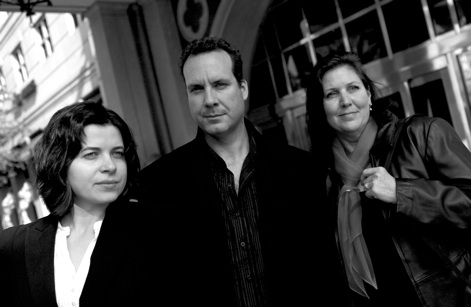Pulse Chamber Music serves up an eclectic and entertaining evening

Pulse Chamber Music performed Friday night in Fort Lauderdale.
“Bridges,” an arresting program of musical crossings between centuries and cultures, was presented by Pulse Chamber Music Friday night at All Saints Episcopal Church in Fort Lauderdale. Despite a very small audience, the trio of violinist Scott Flavin, clarinetist Margaret Donaghue Flavin and pianist Marina Radiushina offered one of the most entertaining concerts of the season.
The music of 20th-century French composer Jean Francaix is consistently well crafted, bubbly and insouciant. The Allegrissimo movement from his Trio combines Gallic cafe music, jazz-inflected clarinet riffs and the gutsy slides pioneered by jazz violinist Stephane Grappelli. In pre-performance remarks, Donaghue Flavin recalled touring Europe in a chamber group directed by Francaix, noting that his lively personality mirrored his music. She reveled in the leaps and growls of his clarinet writing, joining her colleagues in a vivacious performance.
Flavin switched to Baroque violin and his wife to three varieties of recorders for Telemann’s Gulliver Suite. This 18th-century pastiche of dances is a sunny, light-hearted view of Jonathan Swift’s literary classic. Playing with authentic bow and gut strings, Flavin’s deft, precise touch in the Gigue was delightful. With the recorder playing the aristocratic nobility and the violin the uncultured yahoos in the finale, the ear-catching blend of instrumental timbres was bracing.
Unlike the works of his contemporary Couperin, the harpsichord music of Rameau transfers well to the modern piano. Playing a bright-toned Perof grand, Radiushina demonstrated her rock-solid technique and highly personal interpretive instincts in two of Rameau’s Nouvelle suite de pieces de clavercin. In the shifting harmonies of “L’enharmonique,” Radiushina played with a rhapsodic sweep that would not have been out of place in Rachmaninoff or Scriabin. Unfortunately, it was far too unidiomatic for Rameau’s vignette, both harmonically and stylistically. Rameau’s “Les Savages” was based on a dance by two Native Americans he witnessed in 18th-century Paris. Here her style was more convincing, Radiushina blazing through this virtuosic cameo with a the rapid flurry of clearly articulated notes .
Schumann’s Marchenerzahlungen is one of the composer’s most engaging scores with little of the angst and overt passion of some of his late works. This lovely four-movement piece is filled with song and romance. Some of the dance rhythms seem right out of the Vienna of the waltz kings. The melding of sweet-toned violin and clarinet proved exquisite and Radiushina’s bold reading of Schumann’s expansive piano line was commanding.
Chinese composer Bright Sheng blends Eastern and Western musical modes in a brew that simultaneously sounds ancient and contemporary. Traditional classical melody and harmony are only marginal to his Tibetan Dance. The “Prelude” reflects the calm stasis of the Tibetan plains, the violin playing harmonics in the instrument’s highest register. “Song” is scored only for violin and very soft clarinet without piano. This movement’s haunting fragment of a theme is not far removed from Borodin’s In the Steppes of Central Asia.
With Flavin rhythmically hitting the wood of his violin, the spiky keyboard writing of the final “Tibetan Dance” suggests an Asian Stravinsky. The trio gave a brilliant performance of this boundary stretching score that reinvents classicism for the 21st century.
Flavin’s transcription of Gershwin’s Prelude No. 2 adds clarinet to the Heifetz violin arrangement and ornaments the melodic line. His version is altogether winning, capturing the aura of sophisticated blues from the cafe society of Gershwin’s era..
Bridges is a suite by Victoria Bond, painting musical portraits of four bridges over land and water. The first woman to receive a doctorate in conducting from Juilliard, Bond is a highly talented composer and arranger. The opening “Railroad Trestle Bridge, Galax, Virginia” moves to a country and bluegrass vibe. A folk-like Chinese melody drives the calm portrait of “Stone Bridge Over a Reflecting Pool in Souzhou.” Agitated, broken rhythms dart through Bond’s view of the Golden Gate Bridge and cool jazz in the Duke Ellington manner drives the beat of the Brooklyn Bridge.
Bond’s melodic invention is worthy of Copland and her masterful instrumental writing recalls the best scores of Walter Piston and Howard Hanson. Bridges is a terrific piece and the trio’s full-throttle performance was a great finale to a fascinating program.
Posted in Performances
Leave a Comment
Sat Mar 31, 2012
at 4:01 pm
No Comments